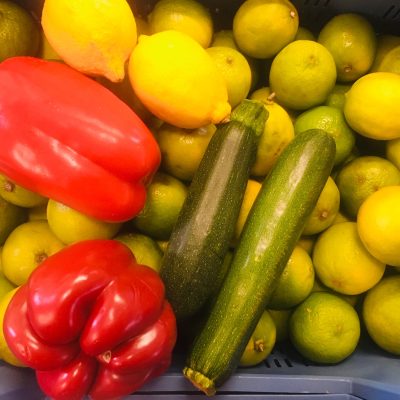Article
“My action project idea was born out of a paradox I was observing in my every day life in Athens: On the one hand, I could count about 10 people begging for their food on the streets of Athens, just on my way to university. On the other hand, many of the students entitled to free meals at their universities’ food clubs were not even finishing all their food on their plates; they were getting extra portions for no reason. All this food was thrown away. This paradox was annoying me and making me think how much food we waste every day while there are other people in desperate need of it.” (Melini)
Senior Fellow Melpomeni (Melini) Kalogeraki had a strong realization on a normal university day. It was the day she observed numerous people begging for food on the streets, while at the same time, she saw how her fellow students had plentiful food in their cafeteria, oftentimes not finishing their meals and throwing away perfectly good food. For her, the combination of these two phenomena became a sort of paradox. How can so many people thoughtlessly waste food while others, roughly one billion people worldwide, go hungry daily? She put two and two together and realized that by combining these two problems, both could be solved. Based on these two distinct, yet related challenges, Melini decided to become what she called a “food-saving ambassador.”
Upon her completion of the 2018 Copenhagen Humanity in Action Fellowship, she remained ever more committed to her initial cause, making it her Action Project. Specifically, she wanted to address the United Nations Sustainable Development Goals no. 2 and 12, which are “no hunger” and “responsible consumption” respectively.
As Melini embarked on her project, she soon realized that there were already many individuals and organizations with the same goal throughout the whole world. She found one such NGO, Bouroume, in Athens and reached out to them to connect them with her university’s cafeteria catering service to distribute left-over food to people in need. And yet, due to legal and bureaucratic reasons, this idea failed. Despite this initial hiccup, she persisted and found another way to fulfill the same goal.
She continued working closely with Bourume and eventually heard of Norton Rose Fulbright, an international law firm whose Greek department was looking for ways to reduce food waste as part of their social responsibility planning. They did not exactly know how to reduce food waste and were in need of guidance. This was a perfect opportunity for Melini, since she was able to step in and work with both Bouroume and the law firm as the mediator between the two. Apart from this networking aspect of her project, she came up with the actual food-saving systems for Norton Rose which consisted of six different steps, three of which the firm implemented right away. The project came around full circle when she found out that many of the kids of Norton Rose employees went to a particular school, so she suggested that awareness be raised on the issue of food waste at this school. Overall, the project succeeded in achieving its two main goals and, in doing so, also improved the lives of many in the community.
For someone trying to implement a similar project, I would say that, apart from adaptability- which is vital- they should also be confident about the work that they have done. (Melini)
Melini’s Action Project demonstrates how a willingness to commit to a cause with perseverance and just a bit of thought can go a long way in helping others: whether it be aiding a company in becoming more sustainable or distributing food to those who need it most, or in her case, both. Melini’s advice to those who may have similar goals is to be adaptable, yet well-grounded and confident in your actions, two characteristics which are resolutely embodied in her project.




